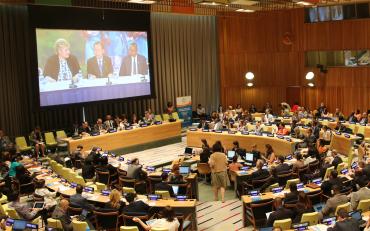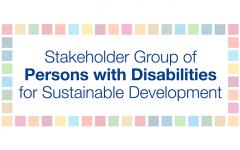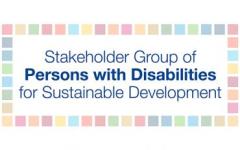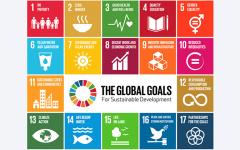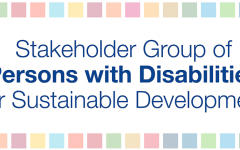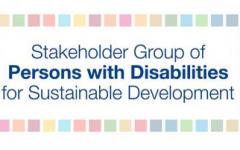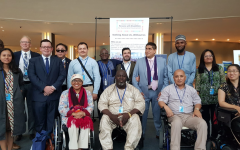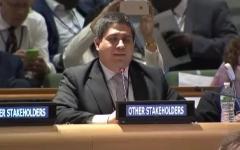On this page:
- ECLAC (UN Economic Commission for Latin America & the Caribbean)
- ESCAP (UN Economic and Social Commission for Asia & the Pacific)
- ECE (UN Economic Commission for Europe)
- ESCWA (UN Economic & Social Commission for Western Asia)
- ECA (UN Economic Commission for Africa)
ECLAC (UN Economic Commission for Latin America and the Caribbean), 18-20 April, Santiago
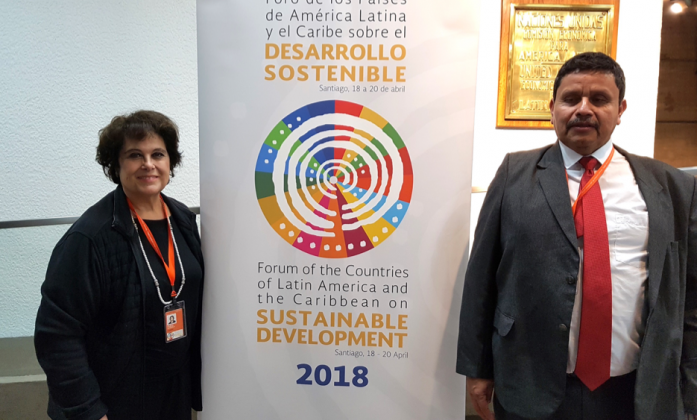
La Segunda Reunión del Foro de los Países de América Latina y el Caribe sobre el Desarrollo Sostenible se llevará a cabo en Santiago, del 18 a 20 de abril de 2018. Con anterioridad al inicio de la Reunión del Foro, los días 16 y 17 de abril se realizarán actividades de la sociedad civil y otros actores relevantes. La acreditación de participantes estará abierta a partir del lunes 16 de abril a las 9.00 horas en la sede del evento (Av. Dag Hammarskjöld 3477, Vitacura).
La Reunión estará abierta a todos los países de América Latina y el Caribe. El presente documento tiene como propósito brindar a los asistentes información útil para facilitar su participación en la Reunión.
Los coordinadores de la Reunión estarán a su disposición para atender cualquier consulta sobre cuestiones de logística y organización que desee formular antes de la Reunión y durante su desarrollo.
ESCAP (UN Economic and Social Commission for Asia and the Pacific) 28-30 March, Bangkok
Asia-Pacific Forum on Sustainable Development (Official Forum)
The Asia-Pacific Forum on Sustainable Development (APFSD) 2018 in Bangkok on 28 - 30 March 2018, around the theme: “Transformation towards sustainable and resilient societies” and focusing on the Goals under review: 6, 7, 11, 12, 15 and 17.
The initial agenda of the Forum will include:
1. A presentation and discussion on the progress made towards the regional road map for implementing the 2030 Agenda for Sustainable Development in Asia and the Pacific, that will feed into the global review and monitoring mechanism the HLPF. Focus will be on regional milestones achievements in the 2030 Agenda implementation.
2. A second agenda item will focus on implementation of the 2030 Agenda, which is a considerable change compared to last year, when this issue was discussed at the very end of the Forum.
3. This will be followed by five different roundtables, each focusing on one of the Goals under review. These will be organized by different UN Agencies. Roundtables will report back to the plenary. (Yet, there is no confirmation from UNESCAP on which UN agency is working on which Goal or which roundtable.)
4. The next main session of the plenary will focus on the voluntary national reviews of Asian‑Pacific countries. There will be presentations from Armenia, Australia, Bhutan, Kiribati, Sri Lanka, Vietnam and Singapore.
5. This will be followed by a discussion regarding further implementing the regional roadmap and designating roles and fostering partnerships.
6. The meeting will conclude with the the adoption of the report and the chair's summary.
OPPORTUNITY! There will be 1 Civil Society speaker invited to speak at the opening of the Forum, and each roundtable will have 1 Civil Society keynote speaker. In addition, there will be opportunity to present collective and constituency statements/interventions from the floor.
****Please Note: Those seeking to attend the Asia-Pacific Forum on Sustainable Development must attend the People’s Forum (unless they are already part of their official national delegations).
People’s Forum on Sustainable Development
The Asia-Pacific Civil Society Forum on Sustainable Development 2018 is now called the People's Forum on Sustainable Development, and will take place from the 25th to 27th of March. This year it will be a larger forum and be hosted by Chulalonghorn University. The organizers expressed keen interest to work together with the disability constituency to make the forum accessible. About 6-8 workshops will be organized clustered around the following themes:
- Systemic barriers to achieve sustainable and resilient societies
- The six Goals under review and intersection to other Goals;
- Accountability and monitoring; and
- Power of people's movements: different concepts and different alternatives and different innovations, approaches, strategies for their struggle towards sustainable development. The organizers hope that the disability constituency will express interest to particularly engage in this topic.
These workshops will be organized collaboratively between different constituencies.
In addition to the above workshops, there will be an OPPORTUNITY! for participants to apply for self‑organized workshops (application will be circulated soon with a deadline of 19th of February). There will be also plenary sessions in which all regions, interaction in the workshop and panels will be able to feed in to inputs.
IT’S TIME TO START PREPARING FOR THE DISABILITY CONSTITUENCY!
Asia-Pacific Regional Civil Society Engagement Mechanism has a designated disability constituency, which is coordinated by the focal point Abia Akram: abia.akram [at] gmail.com
All participation at the People’s Forum as well as at the Official Forum is coordinated by Abia Akram. Considering that both meetings offer plenty of opportunities for persons with disabilities we strongly recommend that the actions detailed below are undertaken in a coordinated manner and by sharing the workload.
If you wish to get involved you can contact Abia Akram directly. Participants of the meetings – or those, who would like to contribute remotely – are welcome to engage in the tasks outlined below, by communicating and in collaboration with the regional focal point: Abia Akram:abia.akram [at] gmail.com
ACTIONS + ROADMAP!
1. Register! If you wish to attend in persons you need to register with the UNESCAP. The UNESCAP opened the call for registration and has also funding opportunity. Deadline to apply is 18th of February! Please follow instructions provided on this website:http://www.unescap.org/events/apcsfsd5
Keep in mind!
- register early by following instructions on the website!
- identify any reasonable accommodations that you may need
- register your personal assistant as well but make sure you indicate her/his role!
- Please submit complete and thorough applications as it is a very competitive process and there is a limit to number of participants, who can attend!
2. Sign up! with the Asia‑Pacific Regional CSO engagement mechanism (APRCEM) to receive regular emails from the Asia-Pacific CSO network APRCEM (see description below), please complete the form here: http://bit.ly/2kiY4Fz
3. Prepare background documents! In a coordinated effort prepare and always emphasize regional challenges, good practices :
- A disability constituency sectoral paper on the theme: Transformation towards sustainable and resilient societies
- A disability constituency thematic short papers on each goal under review
- A concept note for a workshop to be organized by the disability constituency during the CSO Forum, invite other constituencies as partners
4. Organise a side event during the official forum!
- Develop a concept note
- Identify possible speaker
- Identify supporting / co-sponsoring Member States, invite them to deliver speeches/opening remarks
- Include ESCAP and / or in particular the Disability Unit to co-host with the disability constituency
About APRCEM
The Asia‑Pacific Regional CSO engagement mechanism is an open inclusive flexible civil society platform in Asia‑Pacific that works with the UN system across the region in sustainable development processes. It consolidate civil society positions and facilitate the engagement of Asia‑Pacific civil society in regional forums.
Established in 2014 to bridge the gap between the global, regional and national processes.. APRCEM serves as a platform to facilitate CSO engagement in the region, not only among themselves but also with countries in the region. In addition, APRCEM aims to improve dialogue between the UN and civil societies.
The structure is based on the major group and other stakeholders mechanism, but it is broader than that. As such, APRCEM consists of constituency groups and sub-regional groupings. There are 17 constituency groups, beyond the major groups it includes migrants, people affected with HIV, urban dwellers, people displaced by disasters and conflict, social and community enterprises (instead of the business sector), persons with disabilities, and older persons. There are sub-regional groups, such as Pacific, Northeast Asia, Southeast Asia and each has a focal point. The 17 constituency groups and five sub-regional focal points are working under the regional coordinating committee (AP-RCEM), which coordinates day-to-day work to discuss possibilities of engagement for Civil Society in the region. AP-RCEM is the the official partner of UNESCAP and UN Environment Agency to organize and coordinate the Civil Society platform.
ECE (UN Economic Commission for Europe), 1-2 March, Geneva
[REGISTRATION OPEN!] Please register for the main meeting and the two round tables of your choice, by clicking here. Additional information can be found here.
Focal point for ECE is: Marion Steff, PhD marion.steff [at] edf-feph.org
ESCWA (UN Economic and Social Commission for Western Asia): 24-26 April, Lebanon
More Coming Soon!
ECA (UN Economic Commission for Africa), date and location TBC
More Coming Soon!
